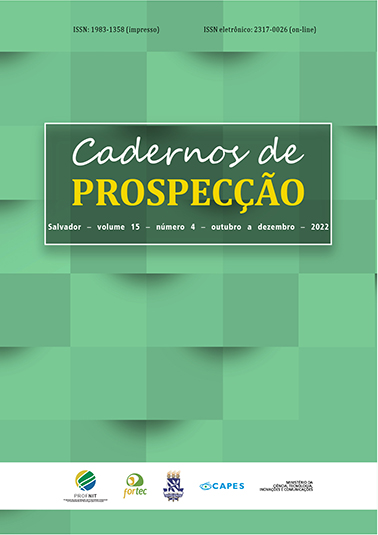The Blockchain Technology in the Brazilian Courts of Accounts
DOI:
https://doi.org/10.9771/cp.v15i4.49749Keywords:
Court of Accounts, External Control, Blockchain.Abstract
The objective of this work is to verify the existence of applications under development or already implemented that use blockchain technology in the Brazilian Courts of Accounts. The researched universe corresponds to the 33 Brazilian external control units. The research is exploratory, descriptive and documentary. The results were obtained through consultations on the websites of the Courts of Accounts, using the term “blockchain”, completing it by opening demands with the respective ombudsman. It was found that (I) only the Court of Accounts of the State of Rio de Janeiro (TCE-RJ) reported that it had developed and implemented a system with blockchain technology for internal use; (II) the Federal Accounts Court (TCU) cav. rried out a survey of the use of blockchain technology in the Federal Public Administration, which resulted in Judgment n. 1613/2020-Plenary; and (III) the Accounts Courts did not report the development of any specific action related to blockchain technology.
Downloads
References
ALCÂNTARA, L. T. et al. Uso da tecnologia Blockchain como instrumento de governança eletrônica no setor público. In: II CONGRESSO INTERNACIONAL DE CONTABILIDADE PÚBLICA, Lisboa, 2019. Anais. Lisboa, PT, 2019. Disponível em: https://repositorio.unb.br/bitstream/10482/34651/1/EVENTO_UsoTecnologiaBlockchain.pdf. Acesso em: 7 jun. 2021.
ARAÚJO, G. S. G. de; SANTOS, K. de F. Evolução da tecnologia smart contracts pela perspectiva dos indicadores de patentes. Cadernos de Prospecção, Salvador, v. 12, n. 5, p. 1.363-1.373, dezembro, 2019. Disponível em: https://portalseer.ufba.br/index.php/nit/article/view/32932/20674. Acesso em: 19 maio 2021.
BRITO, S. L. C.; JÚNIOR, J. C.; TELES, E. O. Prospecção de Uso da Tecnologia Blockchain: uma análise a partir de documentos de pedidos patentes. Cadernos de Prospecção, Salvador, v. 13, n. 4, p. 1.220-1.234, setembro, 2020. Disponível em: https://periodicos.ufba.br/index.php/nit/article/view/29280. Acesso em: 4 abr. 2021.
CONCEIÇÃO, A. F. da; ROCHA, V. M.; DE PAULA, R. F. Blockchain e Aplicações em Saúde. Sociedade Brasileira de Computação, 2019. Disponível em: file:///D:/Documents/Downloads/29-Manuscrito%20de%20cap%C3%ADtulo-246-1-10-20190611.pdf. Acesso em: 4 jul. 2021.
ENCCLA – ESTRATÉGIA NACIONAL DE COMBATE À CORRUPÇÃO E À LAVAGEM DE DINHEIRO. Blockchain no setor público: Guia de conceitos e usos potenciais. [Brasília, DF], 2020. Disponível em: http://enccla.camara.leg.br/acoes/arquivos/resultados-enccla-2020/blockchain-no-setor-publico-guia-de-conceitos-e-usos-potenciais/view. Acesso em: 22 maio 2021.
FERREIRA, J. E.; PINTO, F. G. C.; DOS SANTOS, S. C. Estudo de mapeamento sistemático sobre as tendências e desafios do Blockchain. Gestão. Org., [s.l.], v. 15, n. 6, p. 108-117, 2017. Disponível em: https://periodicos.ufpe.br/revistas/gestaoorg/article/view/231244. Acesso em: 19 maio 2021.
GOMES, V. J. F.; UCHOA, S. B. B.; SANTOS, T. F. S. Mapeamento tecnológico das patentes desenvolvidas a partir da tecnologia Blockchain: um cenário global. Cadernos de Prospecção, Salvador, v. 11, n. 4, p. 1.166-1.181, dezembro, 2018. Disponível em: https://periodicos.ufba.br/index.php/nit/article/view/27193. Acesso em: 4 abr. 2021.
GREVE, F. et al. Blockchain e a Revolução do Consenso sob Demanda. In: SIMPÓSIO BRASILEIRO DE REDES DE COMPUTADORES E SISTEMAS DISTRIBUÍDOS (SBRC) – MINICURSOS, 2018. Anais. [S.l.]. 2018. Disponível em: http://143.54.25.88/index.php/sbrcminicursos/article/view/1770/1743. Acesso em: 7 jun. 2021.
LESSAK, A. L.; DIAS, R. A.; FREY, I. A. Blockchain: prospecção tecnológica em bases de patentes. Cadernos de Prospecção, Salvador, v. 11, n. 3, p. 876-887, setembro, 2018. Disponível em: https://portalseer.ufba.br/index.php/nit/article/view/27006. Acesso em: 19 maio 2021.
MOUTINHO, D. V. Contas dos governantes: apreciação das contas dos chefes de Poder Executivo pelos tribunais de contas do Brasil. [S.l.]: Editora Blucher, 2020. Disponível em: https://books.google.com.br/books?hl=pt-BR&lr=&id=o-LyDwAAQBAJ&oi=fnd&pg=PA39&dq=tribunais+de+contas+do+brasil&ots=PiNbuy5_9o&sig=Q7MRqcF2dDNi4cC57k1e4AjKEhQ#v=onepage&q=tribunais%20de%20contas%20do%20brasil&f=false. Acesso em: 4 jul. 2021.
NAKAMOTO, S. Bitcoin: a peer-to-peer electronic cash system. 2008. Disponível em: https://bitcoin.org/bitcoin.pdf. Acesso em: 14 maio 2021.
OREIRO, J. L. Origem, causas e impacto da crise. Valor Econômico, [s.l.], v. 13, n. 9, 2011. Disponível em: https://docs.google.com/document/d/1RHjBeSaJB3Cq3QhbmU5Cyf7WoDhLx2Qgliydk7ml_aI/edit?pli=1. Acesso em: 7 jul. 2021.
PRODANOV, C. C.; FREITAS, E. C. Metodologia do trabalho científico: métodos e técnicas da pesquisa e do trabalho acadêmico. 2. ed. Novo Hamburgo: Universidade Feevale, 2013. Disponível em: https://www.feevale.br/Comum/midias/0163c988-1f5d-496f-b118-a6e009a7a2f9/E-book%20Metodologia%20do%20Trabalho%20Cientifico.pdf. Acesso em: 24 maio 2021.
ROBICHEZ, G. et al. Blockchain para governos e serviços públicos. Rio de Janeiro: PUC, 2019. Disponível em: https://www.researchgate.net/profile/Paulo-Henrique-Alves-2/publication/331651536_Blockchain_para_Governo_e_Servicos_Publicos/links/5c86e704458515b59e452f93/Blockchain-para-Governo-e-Servicos-Publicos.pdf. Acesso em: 16 fev. 2021.
SIMÕES, M. P. A. et al. Benefícios do uso da tecnologia Blockchain como instrumento para a auditoria contábil. Revista Ambiente Contábil, Rio Grande do Norte, v. 13, n. 1, p. 39-53, 2021. ISSN 2176-9036. Disponível em: https://periodicos.ufrn.br/ambiente/article/view/19535/13641. Acesso em: 7 jun. 2021.
TCU – TRIBUNAL DE CONTAS DA UNIÃO. Relatório de levantamento da tecnologia blockchain. TC 031.044/2019-9. Relator Ministro Aroldo Cedraz. Brasília, 2019. Disponível em: https://pesquisa.apps.tcu.gov.br/#/documento/processo/031.044%252F2019-0/%2520/DTAUTUACAOORDENACAO%2520desc%252C%2520NUMEROCOMZEROS%2520desc/0/%2520?uuid=ce034160-bbc6-11ea-ad32-519ab286dea0. Acesso em: 22 maio 2021.
TREVISAN, K. Quebra do banco Lehman Brothers completa 10 anos, relembre a crise de 2008. [2018]. Disponível em: https://g1.globo.com/economia/noticia/2018/09/15/quebra-do-banco-lehman-brothers-completa-10-anos-relembre-a-crise-de-2008.ghtml. Acesso em: 22 jun. 2021.
Downloads
Published
How to Cite
Issue
Section
License
Copyright (c) 2022 Cadernos de Prospecção

This work is licensed under a Creative Commons Attribution-NonCommercial 4.0 International License.
O autor declara que: - Todos os autores foram nomeados. - Está submetendo o manuscrito com o consentimento dos outros autores. - Caso o trabalho submetido tiver sido contratado por algum empregador, tem o consentimento do referido empregador. - Os autores estão cientes de que é condição de publicação que os manuscritos submetidos a esta revista não tenham sido publicados anteriormente e não sejam submetidos ou publicados simultaneamente em outro periódico sem prévia autorização do Conselho Editorial. - Os autores concordam que o seu artigo ou parte dele possa ser distribuído e/ou reproduzido por qualquer forma, incluindo traduções, desde que sejam citados de modo completo esta revista e os autores do manuscrito. - Revista Cadernos de Prospecção está licenciado com uma Licença Creative Commons Attribution 4.0. Esta licença permite que outros remixem, adaptem e criem a partir do seu trabalho para fins não comerciais, e embora os novos trabalhos tenham de lhe atribuir o devido crédito e não possam ser usados para fins comerciais, os usuários não têm de licenciar esses trabalhos derivados sob os mesmos termos.
Este obra está licenciado com uma Licença Creative Commons Atribuição 4.0 Internacional.





